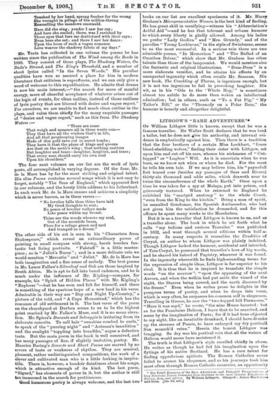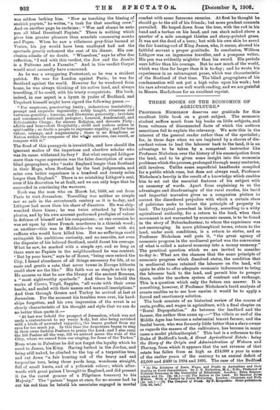LITHGOW'S "RARE ADVENTURES."'"
OF William Lithgow little is known, except that he was a famous traveller. Sir Walter Scott declares that he was bred a tailor, but he does not give his authority, and internal evi- dence is emphatically against him. Then there is a tradition that the four brothers of a certain Miss Lockhart, " foure blood-shedding wolves," finding their sister with Lithgow, set upon him and cut off his ears, whence his nickname of "Cut- lugged" or " Legless " Will. As it is uncertain when he was born, so we know not when or where he died. For the most he tells his own tale. If we may believe him, his " paynefull feet traced over (besides my passages of Seas and Rivers) thirty-six thousand and odds miles, which draweth near to twice the circumference of the whole Earth." Once upon a time he was taken for a spy at Malaga, put into prison, and grievously tortured. When he returned to England he exhibited his " martyrd anatomy" to the whole Court, "even from the King to the kitchin." Being a man of spirit, he assaulted Gondomar, the Spanish Ambassador, who had not given him the satisfaction be demanded, and for this offence he spent many weeks in the Marshalsea.
But it is as a traveller that Lithgow is known to us, and as a traveller alone. The book in which he set forth what he calls "my tedious and curious Travailes " was published in 1632, and went through several editions within half-a.. century. In many respects it resembles the Crudities of Coryat, an author to whom Lithgow was plainly indebted. Though Lithgow lacked the humour, accidental and intended, of Tom Coryat, he possessed that traveller's love of big words, and be shared his hatred of Papistry, wherever it was found. In the ingenuity wherewith he finds high-sounding terms for the expression of simple ideas, Lithgow is far superior to his rival. It is thus that he is inspired to translate the simple words "on the morrow ": "upon the appearing of the next Aurora, and when the welkin had put aside the vizard of the night, the Starres being coverd, and the earth discoverd by the Simile." Even when he writes prose he delights in the pompous terms of poetry, and when he drops into verse, which is very often, he surpasses his common self in eloquence. Travelling in Greece, he saw the "two-topped bill Parnassus." "Here it was sayd," he wrote, "the nine Muses haunted : but as for the Fountaine Helicon, I leave that to be searched, and scene by the imagination of Poets; for if it had hens objected to my sight, like an insatiable drunkard, I should have drunke up the streame of Poesie, to have enlarged my dry poetical Sun scoarch'd veins." Herein the honest Lithgow was bragging. So dry was his poetical vein that all the waters of Helicon would never have moistened it.
The truth is that Litligow's style excelled chiefly in abuse. He writes as though he bad fed his imagination upon the flytings of his native Scotland. He has a rare talent for finding opprobrious epithets. The Roman Catholics never failed to arouse his eloquence, and as his journeys took him most often through Roman Catholic countries, an opportunity
• The TotaU Discourse of the Bare Adventures and Painefull Peregrinations of long Ktneteene Years, Travayles from Scotland to the most famous Kingdorncs Europe. Asta, and Africa. By William Lithgow. Glasgow : James lliaeLehoso and Sons. [12s. 6d. net.]
was seldom lacking him. "Now as touching the hissing of snakish papists," he writes, "a tush for that snarling crew."
And on another page he exclaims : "Woe and shame be unto you all blind Hereticall Papists." There is nothing which gives him greater pleasure than scandals concerning monks and Popes. When he saw a villainous grey-friar burned at Venice, his joy would have been unalloyed had not the spectacle greatly enhanced the cost of his dinner. His con- clusion admits of no doubt. "Wherefore," says he after due reflection, "I end with this verdict, the Jew and the Jesuits is a Pultrone and a Parasite." And in this verdict Coryat would most assuredly have concurred.
As he was a swaggering Protestant, so he was a strident patriot. He was for London against Paris ; he was for Scotland against the world. However far he wandered from home, he was always thinking of his native land, and always travelling, if he could, with his trusty compatriots. His book, indeed, in one aspect is a hymn in praise of Scotland, and Urquhart himself might have signed the following paean :—
"For courteous, penetrating lenity ; industrious tractability ; prompt and exquisite ingeniosity ; nobly taught, vivacious and vertuous gentility ; humane, and illustrious generosity ; inviolate and uncommixed nationall pedegree ; Learned, Academical', and Eclesiasticke Clergy; for sincere Religion, and devoute Piety ; affable and benevolent Hospitality ; civil' and zealous orders in spirituality ; so docile a people to supreame regality ; and for true valour, courage, and magnanimity ; there is no Kingdome or Nation within the compasse of the whip universe, can excell, or compare with it."
The flood of this panegyric is irresistible, and how should the ignorant malice of the imperious and abortive scholar who was its cause withstand its fury P But what enraged Lithgow more than vague aspersions was the false description of some blind geographers, who "make England longer than Scotland in their Maps, when Scotland by the best judgements, and mine own better experience is a hundred and twenty miles longer than England." There is no mistaking Lithgow's zeal, even if his discretion be at fault, and we can only hope that he succeeded in convincing the waverers.
Such was the man who on March 1st, 1609, set out from Paris to visit Jerusalem. Travelling was neither so simple nor so safe in the seventeenth century as it is to-day, and Lithgow had more than his share of disasters. He was ship-
wrecked three times ; he was twice attacked by Turkish pirates, and by his own account performed prodigies of valour in defence of himself and his companions; on one occasion he was set upon by three French murderers in a thievish wood ; on another—this was in Moldavia—be was beset with six
ruffians who would have killed him. But no sufferings could extinguish his ambitious curiosity, and no assaults, not even the dispraise of his beloved Scotland, could daunt his courage.
What he saw, he marked with a simple eye, and so long as there were no Papists in the neighbourhood he was content. "But by your leave," says he of Rome, "being once enterd the City, I found abundance of all things necessary for life, at so
easie and gentle a rate, that never towne in Europe hitherto could shew me the like." His faith was as simple as his eye.
He assures us that he saw the library of the ancient Romans, a "most sightworthy spectacle." And there he beheld the works of Cicero, Virgil, Sappho, "all wrote with their owne hands, and sealed with their names and manuall inscriptions." And thus through Greece and Turkey he arrived at last at Jerusalem. For the moment his troubles were over, his hard- ships forgotten, and his own impression of the event is so clearly characteristic of his thought and style that we can do no better than quote it :—
" At last wee beheld the prospect of Jerusalem, which was not onely a contentment to my weary 133dy, but also being ravished with a kinde of unwonted rejoyciny, the teares gushed from my eyes for too much joy. In this time the Armenians began to sing in their owne fashion Psalmes to praise the Lord: and I also sung the 103 Psalms all the way, till we arrived neere the wals of the Citty, where we ceased from our singing, for fears of the Turkes."
Even when in Palestine he did not forget the loyalty which he owed to James, his King. Having bathed in the Jordan, and being still naked, he climbed to the top of a turpentine tree, and cut down "a fair hunting rod of the heavy and sad turpentine tree, being three yards long, wondrous straight, full of small knots, and of a yellowish colour; which after- wards with great paines I brought to England, and did present it (as the rarest gemme of a Pilgrimes treasure) to his Majesty." The " paines " began at once, for no sooner had he out his rod than he beheld his associates engaged in mortal
combat with some fearsome enemies. At first he thought he should go to the aid of his friends; but more prudent counsels prevailed. He leaped down from the tree, with the rod in his hand and a turban on his head, and ran stark naked above a quarter of a mile amongst thistles and sharp-pointed grass. It was not the deed of a hero ; but with his own skin he saved the fair hunting-rod of King James, who, it seems, showed his faithful servant a proper gratitude. In conclusion, William Lithgow was an ingenuous traveller, and a pompous writer. His pen was evidently mightier than his sword. His periods were loftier than his courage. But he saw much of the world, which was then far larger than it is to-day; and he wrote his experiences in an extravagant prose, which was characteristic of the Scotland of that time. The blind geographers of his condemnation will not put a high value upon his work ; but his rare adventures are well worth reading, and we are grateful to Messrs. MacLehose for an excellent reprint.



























































 Previous page
Previous page